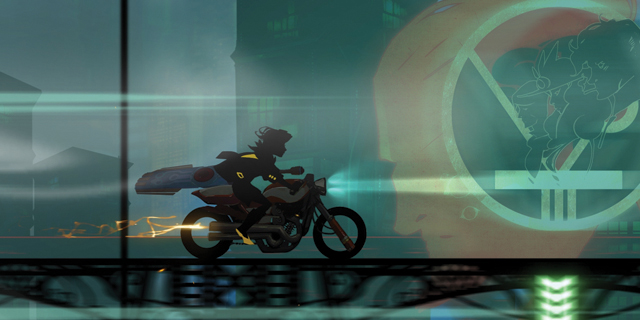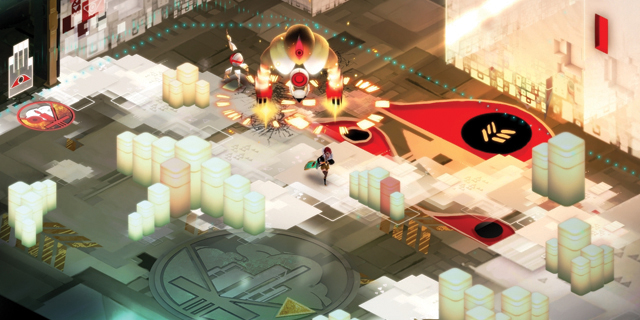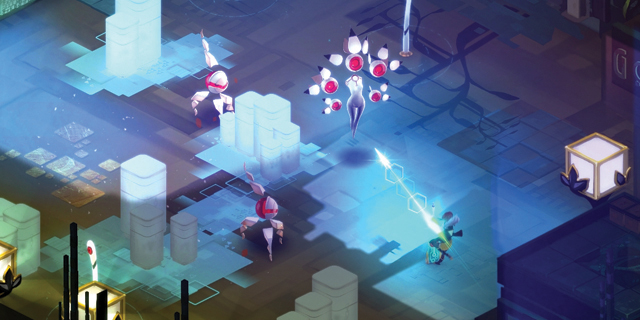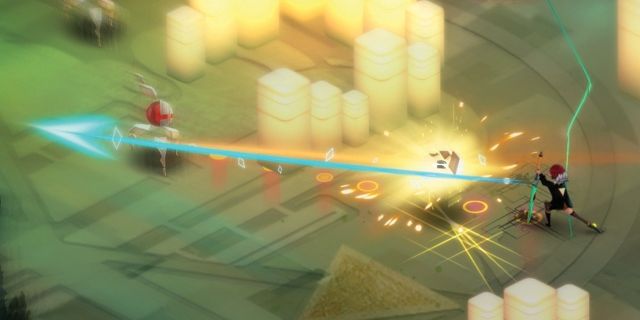
Supergiant Games practically came out of nowhere with 2011 indie darling Bastion, cementing its status as a studio to pay attention to in the coming years. Finally, after over a year of anticipation, its follow-up, Transistor, arrives. Looking at it from a distance, you could easily tell it’s a game from the team behind Bastion, yet it manages to stand apart from Supergiant’s initial release in some unique ways.
Right away, you’re thrown into this mysterious, futuristic world without much context to go on. You play as Red, a famous singer who lost her voice and is on the run for crimes unknown. You’re joined by a talking sword, known as the Transistor, which serves as the main connection between you and the world. You’re constantly kept at arm’s length from the narrative. The game provides you with just enough nuggets of information to keep you wanting more, but it never lets you in close until the end. While I loved the world itself, the story’s purposeful distancing from the player made it hard to find anything to connect with despite the desire to learn more.

Thankfully, the game’s two leads, Red and the Transistor, are given ample opportunities to shine. While their relationship is also kept relatively secretive in the beginning, you slowly begin to understand their history together as you progress, picking up bits of information from computers and other dialogue. By the time the ending rolls around, which opens up the narrative in a fantastic way, you have a better sense of these two characters and their relationship. It’s beautiful and, in a way, heartbreaking; it accomplishes more than I ever expected. Even if the overarching narrative is muddled, the connection between those two made the journey worthwhile.
Even if the story doesn’t grab your attention immediately, Transistor’s visuals definitely will. Its aesthetic is not dissimilar to the one found in Bastion, but with a sci-fi twist. It’s gorgeous, as you would expect from Supergiant, and features another incredible score by Darren Korb. The team took its signature style and molded it into something more futuristic, allowing it to stand on its own despite the obvious comparisons to their previous effort. Even if the majority of the game is a slow burn, the remarkable presentation was enough to keep me going.
Initially, combat seems similar to Bastion, but it isn’t long before Transistor’s main gameplay draw is introduced. You are able to freeze time and plot out your moves, allowing you to get a distinct edge over your opponents in battle. As a result, it’s a much slower game, but it allows for plenty of strategy. It’s not a complex system, just one that allows for the sort of tactical approach to battles you never got from Supergiant’s previous game. It did take a while to fully grasp some of its intricacies, but there is plenty to like about its brand of action.

The real draw is the customizability of the combat. As you level up, you unlock new abilities, known as functions, each of which can be used in one of three ways: active, passive and upgrade. Active functions are assigned to your four main face buttons and are essentially your main moves during combat. Passive are abilities that stay in place over the course of a battle, depending on what you equip. Lastly, upgrade functions add on to your main active functions and combine the two abilities into something even better. There are tons of different function combinations, and whenever I had a chance, I switched up what I was using in order to try something new.
Being able to customize your abilities in so many ways adds depth to the combat I was not expecting, and each encounter allowed me to try new strategies when able. I ended up with a select few favorite combinations, which carried me through most of the game, but I wasn’t above some experimentation from time to time. If you’re unsure about certain ability combinations, there is a practice room, but it is only available in certain areas of the game world. Restricting access to it made me less interested in trading in my go-to moves for something new and riskier, even if I still tried to mix things up from time to time.

I can’t fault Supergiant for attempting something entirely different this time around with the combat. It succeeds at bridging the gap between action and strategy and the level of customization is overwhelming in the best way possible. Having said that, the gameplay, despite its inventiveness, never quite clicked with me the way I was hoping it would. The slow pace made every battle drag on, even if I enjoyed messing with the function customization. It never found its footing and always seemed to encourage you to try new abilities, but never gave you too much of a reason to and wasn’t keen on allowing you to practice them whenever you wanted. The pacing made it less enjoyable for me despite my appreciation of its tactical approach.
Despite my qualms with the combat, Transistor is amazing in many of the same ways Bastion was. It’s a gorgeous game with a memorable world and some phenomenal moments that really help it stand out in the very crowded field of indie games. It is a much slower title than you might expect if you’re looking for Bastion 2.0, both in terms of story and gameplay, but I can’t recommend it enough thanks to the character interactions and intriguing world the team at Supergiant crafted. Above all else, it’s an experience you won’t soon forget.
Pros: Excellent presentation, brilliant character interactions, fun ability experimentation
Cons: Muddled story, combat never finds its footing



















